My identity as a Muslim plays an integral role in my passion for wildlife and conservation. I enjoy exploring Islam’s stance on looking after the environment and hope to encourage more Muslims to engage with nature on a greater, more spiritual level. Throughout the Quran, the holy book of Islam, God scatters verses of the natural world reminding me of God’s ability to create, sustain and beautify. I have also been fascinated in reading about the ways in which the Prophet Muhammad (peace be upon him) interacted with and cared for wildlife. Through this traineeship, I have been able to better understand the relationship between myself, nature and God.
How Islam has shaped my view of nature and wildlife by Keeping it Wild Trainee Nazia
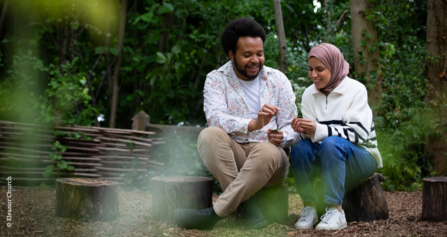
Image captured by Eleanor Church at Camley Street Nature Reserve.
The Prophet Muhammad (PBUH) is an important figure in Islam; Muslims believe he is the last Prophet, sent from God, to deliver the message of Islam. He is described as a ‘walking Quran’ meaning that he applied everything that was divinely revealed to him in his daily life. It is through his actions, speech and habits that Muslims are able to practice their faith, alongside the teachings in the Quran. After stating his name, Muslims say “peace be upon him” as a way of honouring him, I will use the abbreviation: PBUH each time his name is mentioned.
Islam is a holistic religion that provides Muslims with the framework to live a moral and ethical life, and there is no figure that greater exemplifies this than the Prophet Muhammad (PBUH). His appreciation for flora and fauna is recorded in numerous ahadith which has been of particular interest to me. A hadith is a record of the sayings or customs of the Prophet Muhammad (PBUH), the plural is: ahadith.
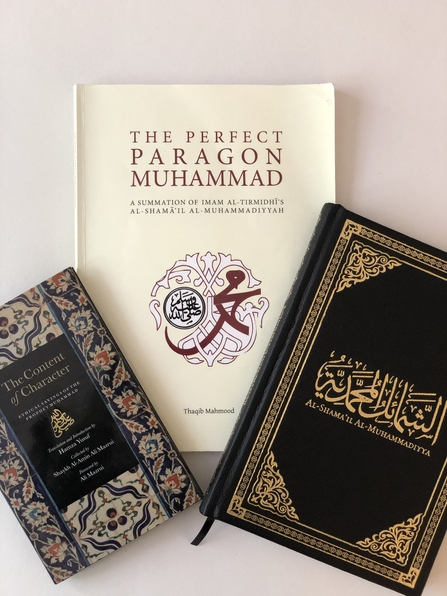
Books about the Prophet Muhammad (PBUH).
In Muhammad the Perfect Man, Al-Sayyid Muhammad bin ‘Alawi bin Abbas al-Maliki al-Hasan opens the chapter about the Prophet Muhammad’s (PBUH) mercy with animals by writing: “The Prophet Muhammad (PBUH) would enjoin mercy to animals and forbid their owners from starving them, wearing them out, making them carry loads constantly, overburdening them, or treating them in any way that caused them suffering.” One hadith mentions that the Prophet (PBUH) once entered an orchard in which there was a camel. When it saw the Prophet (PBUH), it cried out and shed tears, he then patted the camel’s head, and it became quiet. He said: “Who owns this camel, whose camel is this?” A young man approached, and the Prophet (PBUH) said: “Do you not fear God for the sake of this beast, which God has given you? He complained to me that you starve him and wear him out!” This hadith demonstrates the importance of animal welfare and accountability; we should not harm animals as they are a noble creation of God’s. On another occasion, when someone took the chicks from a lark’s nest and she began to panic, the Prophet (PBUH) said: “Who has caused her to fret about her brood? Give her offspring back to her.” The concern that is shown for this bird demonstrates that human beings should not cause harm or distress to wildlife.
The Prophet (PBUH) is described by God as a ‘mercy to all’, and indeed we see his mercy manifest not just to humans, but to all living beings. Throughout his life, the Prophet (PBUH) enjoined kindness and compassion to the wildlife around him; the examples aforementioned are testament to this. His care and concern for wildlife inspires me every day.
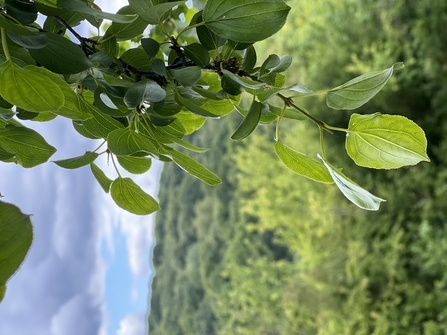
Image captured by Nazia at Hutchinson's Bank.
What’s more, the Prophet (PBUH) explained that everything in the heavens and the earth glorifies God in ways we may never comprehend; the rustling of the leaves, the singing of the birds and even the croaking of the frogs are ways that nature praises its Creator. One hadith states that the Prophet (PBUH) forbade the killing of frogs saying: “their croaking is glorification (of God).” It is through reading ahadith like this that I have been able to appreciate the natural world and the wildlife we share it with in a more meaningful way.
Throughout the traineeship, I have witnessed such beauty that has left me in awe, which, in turn, has increased my reverence for the One who created it all. The intricate details on the bark of the hornbeam tree, the exquisite colours on the peacock butterfly and the charming beauty of the greenfinch are just a few examples of what has led me to have a greater appreciation for God.
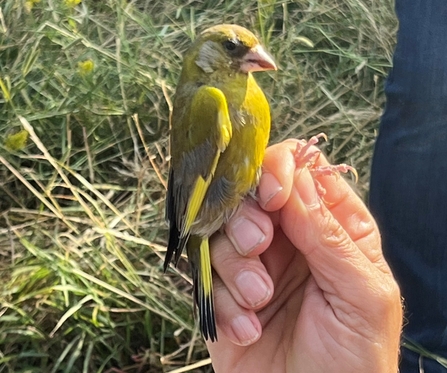
Image captured by Nazia at Walthamstow Wetlands during a bird ringing session.
In chapter 45 of the Quran, it says: “there are signs in the heavens and the earth for those who believe: in the creation of you, in the creatures God scattered on earth, there are signs for people of sure faith; in the alternation of night and day, in the rain God provides, sending it down from the sky and reviving the dead earth with it, and in His shifting of the winds there are signs for those who use their reason.” (45:3-5) What’s fascinating about these verses is that God says that only those who ‘use their reason’ are able to see the signs around them and attribute them back to Him. However, there have been numerous times in my life when people have said that believing in God and in a Divine Book is far from using one’s reason; they reduce religion and religious texts to rules, regulations and stories that inhibit one’s reason. In chapter six of the Quran, it recognises this as it says that those who don’t believe in God argue: “These are nothing but ancient fables.” (6:25)
But, for those of us who believe in God, we see religion and the Quran as a way to witness the signs of God that exist all around us. Interestingly, in Arabic the word for ‘sign’ and ‘verse’ are the same: ayah. It suggests to me that through reading the verses of the Quran we are better equipped to see the signs of God around us, and perhaps for some of us, we recognise the signs of God around us which then inspires us to read His verses or better appreciate them.
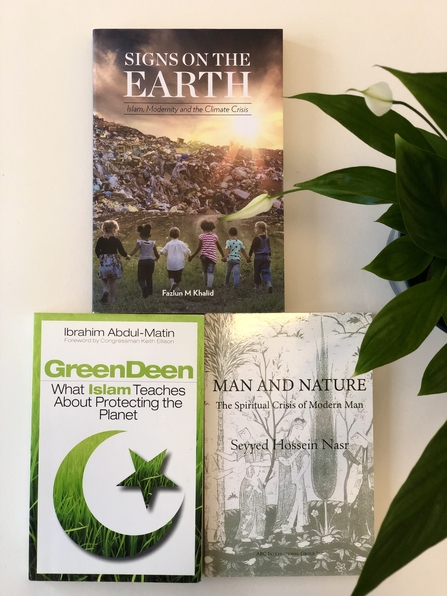
Books about Islam and the environment.
As someone who believes in God, I recognise that I have not been put on earth to conquer or destroy the land; nor have I been created to harm wildlife, I am here as a steward who simply coexists harmoniously with the natural world and the wildlife I share it with. In the words of the Quran, “The servants of the Lord of Mercy are those who walk humbly on the earth, and who, when the foolish address them, reply, ‘Peace.’” (25:63)
Nazia Sultana is the Founder of Sustainably Muslim, a platform that aims to inspire and empower Muslims to serve the environment and their community through education and social action.
Website: https://sustainablymuslim.org/
LinkedIn: www.linkedin.com/company/sustainably-muslim/?viewAsMember=true
Instagram: @sustainablymuslim
Twitter: @sustainablymus
